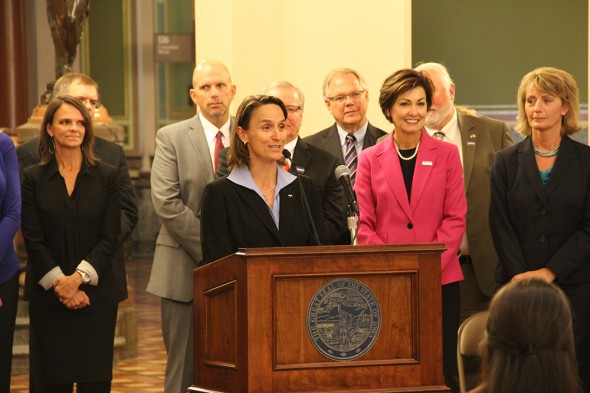
The head coach of Drake University women’s basketball team will help lead a new program that challenges the state of Iowa’s basketball coaches to mentor young women in STEM (science, technology, engineering, and mathematics) disciplines.
Jennie Barancyzk will be the official spokesperson for Iowa’s “Coaches’ Mentoring Challenge,” through which coaches will reach out to their university, college, or high school campus networks to develop mentors for girls and women interested in STEM.
Iowa State University, University of Iowa, and University of Northern Iowa will join in the challenge alongside Drake, whose leaders pledged to generate 100 mentors over the next four years. Sandy Hatfield Clubb, athletic director at Drake University, announced the new program at a state press conference today that focused on a broader state initiative to engage young women in STEM disciplines.
At the press conference, Iowa Lt. Gov. Kim Reynolds announced Iowa’s adoption of a national public-private model that will prepare thousands of mentors who can work to inspire interest in STEM disciplines. The first statewide model of its kind, Million Women Mentors (MWM)-Iowa, targets 5,000 female and male mentors from all 99 Iowa counties in the next four years. Other participants in the announcement included STEMconnector CEO Edie Fraser, Iowa Association of Business and Industry President Mike Ralston, and Jana Rieker, Bankers Trust vice president of sales and marketing.
“Launching MWM-Iowa is another component of our statewide-strategy to attract individuals to STEM careers. In particular, I believe mentors can guide, encourage, and open doors for girls and young women to be fully equipped for the great jobs of tomorrow in STEM-related careers.
“In the United States, STEM is a driving force behind economic growth, stability, and educational success. That’s why, we’re creating an environment in Iowa that prepares all of our students with the necessary skills to compete in an global knowledge-based economy,” stated Reynolds.
Additional announcements made by Lt. Gov. Reynolds at the news conference included: naming Ralston and Rieker as MWM-Iowa co-chairs and recognizing 12 other individuals as members of the MWM-Iowa Executive Council.
Rieker emphasized the quality opportunities that await Iowa girls and young women in STEM fields. “In the past 10 years, growth in STEM jobs has been three times greater than non-STEM jobs. Also, women with STEM jobs earn 33 percent more than females in non-STEM jobs.”
“We know 80 percent of the fastest growing occupations in the United States depend upon mastery of mathematics and scientific knowledge and skills. Being able to secure 5,000 female and male mentors in Iowa to urge young girls and women to consider STEM fields is a huge step forward in increasing awareness and generating excitement,” said Rieker.
The Coaches’ Mentoring Challenge led by Drake University will officially kick off with the start of the NCAA Division I women’s basketball season in November.
“I’m pleased that Drake Athletics is leading the charge in this first-ever challenge for girls and women interested in STEM,” Hatfield Clubb said. “Coach Baranczyk will make a personal invitation to all university college and high school coaches across the state to join her and her colleagues in this initiative.”
The initiative dovetails with a transformative model for Division I athletics at Drake University that prioritizes athletics as an intentional, co-curricular part of the student learning experience. The project also aligns with a broader STEM initiative at Drake University, which the state has designated a South Central Iowa STEM Hub. Drake’s vision for STEM education—with an ‘E’ for ‘education’ rather than engineering—at the University includes an interdisciplinary approach that places future scientists and educators together in a collaborative, synergistic learning environment that will fulfill students’ personal aspirations and society’s needs for a competitive workforce.

